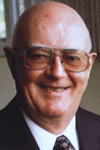New Ideas
On Mercy: The Case of Mid-West Family Broadcasting
Mid-West Family Broadcasting, headed by Thomas Walker, has quietly stayed in the shadows, supporting the International Forgiveness Institute since 1990–for a generation. Readers, please note well that many philanthropists have a pattern of funding non-profit organizations for a few years and then moving on. This did not happen between Mid-West Family and IFI.
In 1990, I received a letter (email was not “on a roll” then as it is now) from William Walker, Thomas’ father. He told me that years ago he received a doctoral degree from my own department at the university. He said he now would like to give back to the social sciences and that he had the resources to put the psychology of forgiveness on the map.
Up to that point, the science of forgiveness was in its infancy. The very first scientific article on person-to-person forgiving was published by our

William Walker
group in 1989. (There had been a handful of studies on apology up to that point, but no science published on the issue of forgiving between and among people). William had a plan to advance the thinking in this area. With his help, we developed the first psychological instrument to measure person-to-person forgiveness ever published. We devised strategies to map out the process of forgiveness and tested these. One example of the fruit of William Walker’s philanthropy is a study of helping people in residential drug rehabilitation to forgive and thus to become emotionally healthier.

Thomas Walker
Under the care of Thomas Walker, the IFI has quietly built the most comprehensive set of curricular materials for teaching forgiveness in the world. The forgiveness curriculum guides have made their way to schools on every continent now. We at the IFI are personally shepherding the growth of forgiveness education in Madison, Wisconsin, Milwaukee’s central-city, Belfast, Northern Ireland and Liberia, Africa. We are making inroads in other war-torn and contentious regions of the world. We are doing so because of Mid-West Family Broadcasting.
Mid-West Family Broadcasting runs the following stations in Madison, Wisconsin: WJJO | WMGN | WJQM | WWQM | WMLV | WHIT | WOZN. They are in four other midwest markets as well.
We take the time here to acknowledge the mercy of Mid-West Family Broadcasting and the Walker family. You are making the world a more merciful place, a more forgiving place, because of your mercy. Thank you.
Robert
What Is a Good Heart?
A close friend asked one of us yesterday, “What is a good heart?” We never had been asked this before. Our response is below. What is your response?
A good heart first has suffered. In the suffering, the person knows that all on this planet are subjected to suffering and so his heart is compassionate, patient, supportive, and loving as best he can in this fallen world. The good heart is forgiving, ever forgiving, vigilant in forgiving. The good heart tries to be in service to others. The good heart is no longer afraid of suffering and has joy because of the suffering, not in spite of it. Having suffered and having passed through suffering, the good heart dances. Others do not understand the good, joyous heart. Yet, the one with the good heart does not compromise the goodness and the joy. It is like a valuable gift received and she knows it.
Dr. Bob
The Light of Forgiveness
This might help you understand what it is you are doing when you forgive. We are in a dark room, which represents the disorder of unjust treatment toward you. As you stumble around for a match to light a candle, this effort of groping in the dark for a positive solution represents part of the struggle to forgive. As you now light the candle, the room is illumined by both the light and warmth of the candle. When you forgive, you offer warmth and light to the one who created the darkness.
You destroy the darkness in your forgiving.
Now here is what I am guessing you did not know about the light of forgiveness: That light does not just stay in that little room. It goes out from there to others and it even continues to give light across time. For example, if you shed light and warmth on a person who has bad habits, he or she might be changed by your forgiveness and pass it along to others in the future.
Now consider this: If you give this warm candle of forgiveness to your children who give it to their children, then this one little candle’s light can continue across many generations, long after you are no longer here on earth.
I am guessing that you had not thought about forgiveness in quite this way before.
Dr. Bob
The Clash of Cultures: Forgiveness vs the Culture-of-Me
As I sit here watching a Major League baseball playoff game, I am fascinated by the commercials—yes, the commercials. The fascination arises from the observation that virtually every commercial is about wonderful “me”—rewards cards, get more cash back, eat fattening foods just because.
I began to ask myself: Will people who view this stuff end up being better persons as a result of spending time this way? I do not think so because the focus is exclusively on “me,” “me, “me.” It is a self-absorbed world of diversion.
Forgiveness is a culture unto itself when placed next to the world of the commercial. Forgiveness asks of us. It demands. It requires discipline and self-sacrifice. It clashes with the “cheese cake bites” in the commercial.
If we spend, say, 70% of our time in the culture-of-me, how will this affect our understanding and practice of forgiveness? Could all this time in the culture-of-me dull us to the importance, beauty, and challenge that is forgiveness? I think so. If we have the chance to drown our sorrows in the culture of consumption, why then venture at all into the culture of struggle that is forgiveness? And what if we spend 90% or more of our time in the culture of consumption, is there then any hope for the flowering of the counter-culture of forgiveness?
We are in a clash of cultures and I wonder to what extent people know that. “Letting it go” or “just moving on” may be the easier way to go when we are not encouraged to truly forgive from the heart, in service to the one who hurt us, with an eye toward the betterment of that person.
How can we allow ourselves time in the culture-of-me without being consumed by the consumption? How can we step into the culture of service and not think it too difficult or too “out there” so that we return frequently? Or better yet, how can we step into the culture of service and bring the moving van and stay there?
Perhaps the first step is to realize that we are in a culture-of-me. Then we have to decide if we wish to live out our lives there. We really do have a choice.
Dr. Bob
Future-Forgiveness
I just came up with this idea of “future-forgiveness” this week, after almost three decades of thinking daily about forgiveness. I think it is an important idea.
By “future-forgiveness” I mean an attitude you cultivate in moving into the future. As you forgive people for past injustices, forgiveness comes to be a part of you. You begin to see that you can love those who are cruel to you, and if you can do that, then you can love those who are interacting pretty well with you. Then you come to realize that this is how you can live your life—loving others as a way of life—no matter what life throws at you.
“Future-forgiveness”—committing to going into your future with love for others no matter how they treat you—is a joyous way to live.
Dr. Bob



